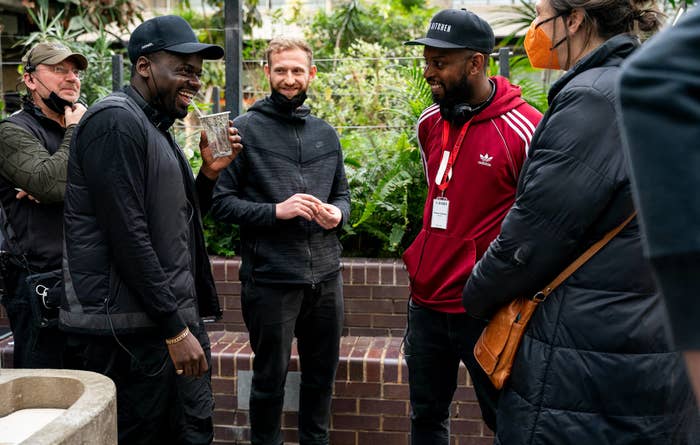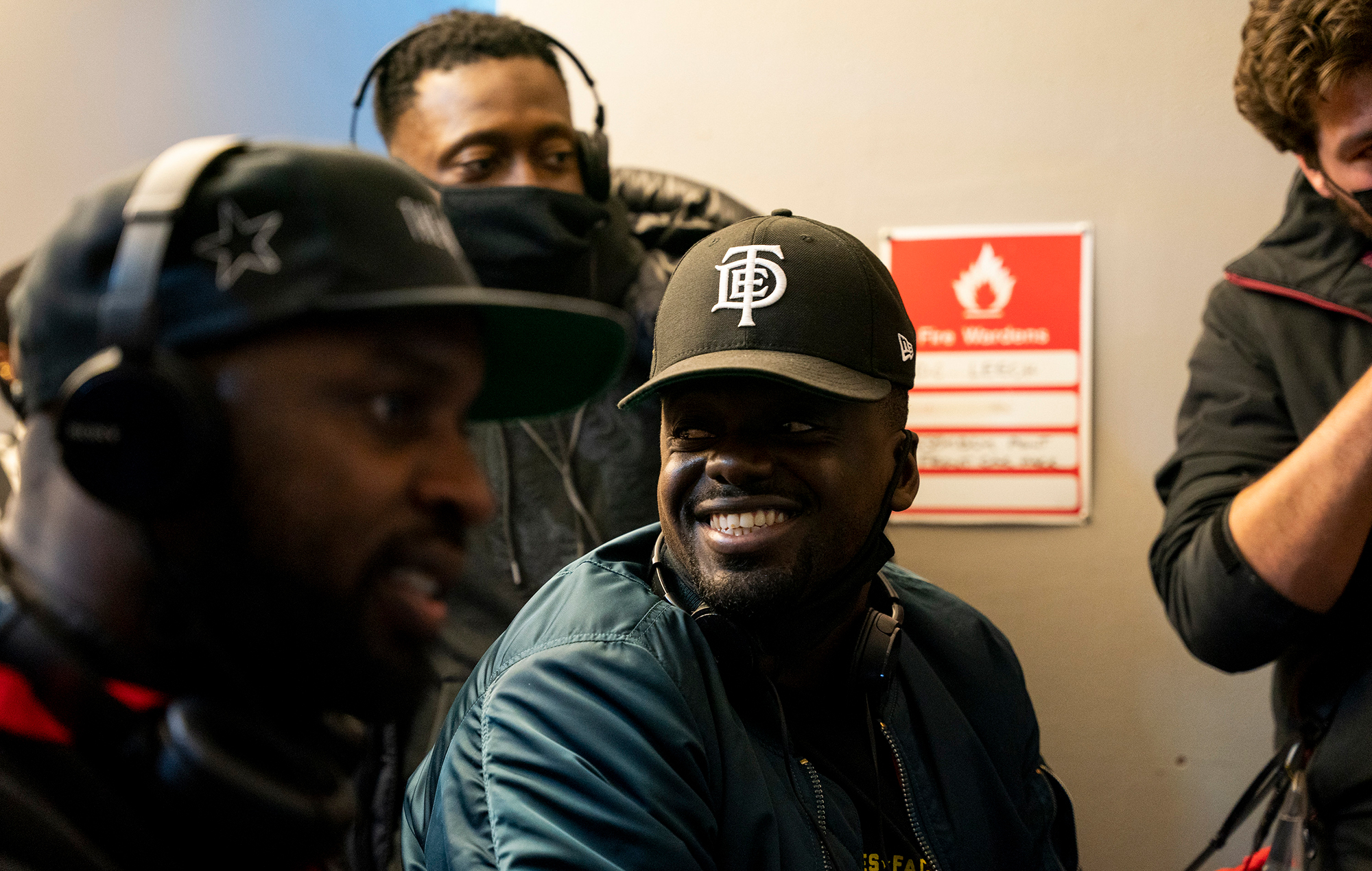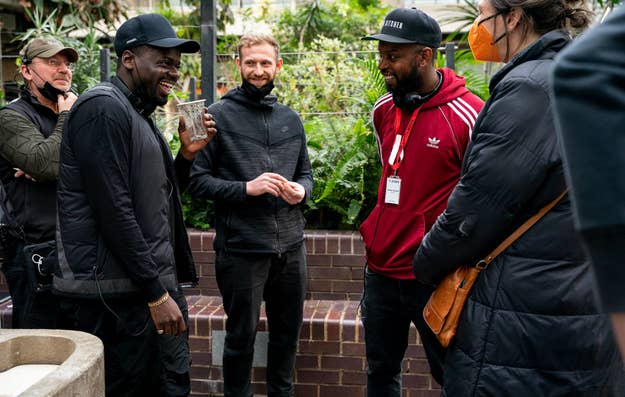
Netflix’s The Kitchen—directed by superstar actor-turned-director Daniel Kaluuya and architect-turned-filmmaker Kibwe Tavares—is a dystopian social-science-fiction film based in London and features some familiar faces, such as Kane ‘Kano’ Robinson, Hope Ipoku Jnr, Ian Wright, BackRoad Gee, and Cristale, as well as the show-stealing newcomer Jedaiah Bannerman.
‘The Kitchen’ is the name of an area bubbling with life but disenfranchised by society; under threat of being knocked down, The Kitchen deals with the relationships within this area and how interacting with it can dictate one’s sense of community or individualism. The film—which is both Kaluuya and Tavares’ feature-length directorial debuts—is about community, values and fatherhood, but also the displacement of rampant gentrification.
“Kibwe is from South, Daniel grew up in Camden, both of them are from communities that have changed, and they’ve seen communities be pushed out of their homes,” said Daniel Emerson, the film’s producer, during a Q&A at the London Film Festival. “For them, The Kitchen is sort of like the utopia, and inner-city London is the dystopia. The Kitchen is everything that is being left behind by London, which is just pushing towards homogenisation.”
The concept of The Kitchen was born in a setting many acknowledge as a pillar of community: the barbershop. A lot of barbershops are hubs of intergenerational and multicultural controversial debates on life, on politics, and culture—back and forths on football, on music, and anything else that can entice someone to break their silence to add their two pence. The barbershop can also be a therapeutic space, a cultural hub, a place where you may hear of dangersome and moviesque stories.
“I was in a barbershop in Holloway one day, my old barbershop, and someone came in describing a smash and grab,” says Daniel Kaluuya, painting the scene of the day a dream had spawned. This man was detailing how he and some youths pulled up on a place and exacted a heist, robbing it blind and getting away within 30 seconds. In and out, smash the glass, take the jewellery and absconding. “He was gassing up the situation and I was sitting there, thinking: “Rah! I want to see that film.”
However, even within the contentiousness, you can recognise points of community. As a regular at the barbers, this is a man Kaluuya would see every now and then. Although, after explaining that story, he vanished. He most likely went to prison, but such a story in these settings usually has no ending. It is left open, ambiguous, and subject to thought. “I didn’t see that man again. I think he got locked up for it. He was just a regular, then he was gone.”
It was such a wonder about that man’s gassed story of a heist that set Daniel Kaluuya on a journey to realise The Kitchen. His first act was to pitch the film to Kibwe Tavares after they’d finished working on their short film, Jonah, back in 2013. That same year, whilst working in theatre, Kaluuya rekindled a childhood friendship with Emerson, meeting again one night after his performance in John Wright’s Season In The Congo at the Young Vic.
A film assistant and aspiring producer, Emerson had also been invested in the then-state of film, such as seeing Kibwe’s final architectural film project, Robots of Brixton—an animated sci-fi film that reimagines Brixton, South London, in the future inhabited by robot life. With the three recognising the potential of their own ambitions within the industry and the pitch that Kaluuya spoke of, they came together to workshop this initial idea in that very same barbershop. The film went through many stages and evolutions as the trio developed their skillset and invested in the concept. The Kitchen is not only symbolic of many areas in London, but also other major cities in the country where gentrification has enveloped that melting pot of culture that produced so much of what we know and love.
“Kibwe definitely had a vision and a vibe—it feels very Elephant & Castle, the market for instance,” says Daniel Kaluuya. “It reflects what real London is like—or rather, certain settings of it. We wanted this to be a microcosm and metaphor for London, and any other city around the world. It can feel like Rio De Janeiro, New York, Paris.”
After a decade of arduous work, The Kitchen closed the 67th London Film Festival. On stage stood Daniel Kaluuya, Kibwe Tavares, Daniel Emerson, the enigmatic grime star-turned-actor Kane ‘Kano’ Robinson, and the captivating, fresh-faced Jedaiah Bannerman. Having spent time on set during the final days of filming, we caught up with the directors again to talk more about the greatness of The Kitchen.
“We aren’t trying to make it like, ‘It’s so hard for us here.’ I hate that shit. Where I grew up, it was fun. It was dangerous, but it was fun. You want to have that element, to tell the truth of how we lived. I don’t think a lot of these films tell that truth.”—Daniel Kaluuya
View this video on YouTube
COMPLEX: How did it feel to close out the London Film Festival with The Kitchen?
Daniel Kaluuya: It was a great moment for the team, the cast, the crew—everyone! It’s good that we got the best kind of platform in the London Film Festival, in that it aligned with the film, what it’s about, and introduced it to the city.
Kibwe Tavares: I felt really proud. I think when we started—Daniel Kaluuya, Daniel Emerson, and I—our initial intention was to do something quick and find a way to articulate our voices. Over a period of time, the project built and changed. When you see what it grew into, you’re like: “This is amazing!” We couldn’t have dreamt that it would be such a huge thing from the outset. I was proud, like a painter painting from scratch. Being able to see this through to the end, and in anticipation of that, I was excited about it... It was a lot of work, though.
When and how did the idea of The Kitchen come about?
Daniel Kaluuya: They’ll show the ends, they’ll show the block, they’ll show drugs, they’ll show this and that, but there isn’t a church there, no kids playing out—like there’s no happiness in our lives, or something. I was in a barbershop in Holloway one day, my old barbershop, and someone came in describing a smash and grab. He was gassing up the situation and I was sitting there, thinking: “Rah! I want to see that film.” Then I didn’t see the man again. I think he got locked up for it. He was just a regular, then he was gone. Back then, I wasn’t really educated on film like that. I grew up watching Home Alone, The Mask, Friday, Bad Boys—you know, the usual. When I got into this industry, they started banging on about film, film, film; they’d look at you weirdly if you didn’t have that cinephile scope. I remember HMV had a sale those times: £1 films! I bought Reservoir Dogs, went home and watched it and I was like: “This is hard!” I thought the scene the guy described in the barbershop would be like Reservoir Dogs, but in the hood. I did Jonah with Kibwe, in Zanzibar, and I pitched this idea to him. “Ay, bro, we can do this heist film, between us man.” Then we went away. The idea went away.
Eventually, Kibwe came back, saying: “This idea, man, count me in!” And Dan Emerson? He was my best friend from nursery to primary school. In Year 2, he went somewhere else, I stayed, we got on with life. Then I saw that he was working in the industry and we met again. Eventually, we all spoke about this heist-like idea together. I think I was really tired of pitching, writing, sending treatments… I thought it was dumb that we’re in the film business but we present the idea not in the medium that we want it to be. That is not wise. I was like, “You man! We should just shoot it.” Back in the day, I used to shoot sketches with my friends for YouTube, so, in a way, it was bringing that energy back. We all put together £200 each, went to that barbershop in Holloway, and recorded this thing—it was like a Reservoir Dogs short. We did that and pitched it to Channel 4, with the treatment and the short. It showed what we were going for, the tone we were going for, and it evolved into the concept of The Kitchen.
Kibwe, when you first heard about the concept of The Kitchen, what drew you into it and what impression did it make on the back-end?
Kibwe Tavares: From that story Daniel pitched about the barbershop, we started talking about the concept and worked together to develop something, developing and adding new ideas, and we built it over time. We started to talk a lot about London, our relationship with London, about community and fatherhood, how we can build a film that has a cultural impact but tells a very human story at the heart of it. How can we have something where the canvas is big, and the world feels like ours? It can pull people in. There’s more of a social-fiction in a way; there’s not so much science that defines the world—in a sense of the sci-fi—there’s more of a cultural thing with how we applied it. What is the weight that comes with that sci-fi for those people in these areas? How can we represent London, a London that we love, but tell a really nuanced human drama? That was an ambition.
The casting for this film is spot on. Seriously. What was the process like for you guys when it came to picking the right acting talent?
Daniel Kaluuya: For me, you don’t go in there with a plan like, “I want this type of person,” as someone can come in and really surprise you. So you stay open. But when Kane [‘Kano’ Robinson]’s name came up, I was like—“Him! He could do it.” I remember watching him on the first season of Top Boy, thinking: “What the fuck!” He just jumped into acting, but I was like, “This brother is one of the best actors of his generation!” And I thought everyone wasn’t seeing it. Everyone around me was like, “Yeah, he’s great,” but the industry wasn’t getting it. I just thought he was the coldest. I knew he would add a different vibe to our thing. But whole cast is interesting—everyone’s really fresh: BackRoad Gee’s in it, Hope [Ikpoku]—who’s also in Top Boy—he’s in it, and Jedaiah, a fresh actor, he’s in it. In terms of the tone, and Kibwe’s vibe, it’s all about being fresh, about who could bring that tone and energy.
“Hopefully, people see themselves in this, are able to immerse themselves, and take from it what they want. They’ll see themselves, they’ll see their city, they’ll see what’s important to them and it will allow them to feel it.”—Kibwe Tavares

What are the different elements that each of you brought to the team?
Daniel Kaluuya: I pitched the idea to Kibwe, Daniel Emerson got involved, and we all knew we wanted a big film. We were all on being ambitious, and saying that we want to capture the future of London with a unique aesthetic. We just gave everything. The London Film Festival was a massive moment because every single person in the cast, aside from a few key creatives and personnel, were born and bred in London. That rarely happens, you know what I’m saying? We watched something we wanted for our city, stuck at it for this number of years, to get to a point of it coming out on Netflix.
Kibwe Tavares: We came together at the right time with all of our careers. I had just made the Jonah short with Daniel, and he wanted to write something. I wanted to start working on my first feature-length film, and Daniel pitched this idea and it all fell into place. Daniel Emerson, our producer, was very tenacious—he was like, “How do I support you guys? How can I help you build this?” When you’re coming up with people at the same time, things evolve as you grow. My background in architecture and Daniel Kaluuya’s background in performance and writing merged with a really dogged producer in Daniel Emerson. We were quite organic in responding to what the film needed. For example, sometimes we needed to push it one way to see it through. When we got the green light for the project at the end of 2021, Kane came into the process and he brought and added more. So we tried to create an infrastructure that allowed the project to develop organically. Then Ian Wright came, Hope, Cristale… The core of us three were the foundations for that.
When I consider London, in a futuristic and present sense, it feels very dystopian. It feels like we’re being priced out of our homes, politically there’s a lot of struggle, and it’s very hard to sustain and live here. How did you guys see this futuristic version of London, of the ends?
Daniel Kaluuya: For me, it’s like I realised everything I was doing regarding research, reading so many books about the future, it was always about rich people. You never see people who are working-class, who are actually the backbone of society, and what their lives were like. I was like, “Oh! Why is that?” That was a big thing for me. Also, it was a journey that made me really understand London, England, and how we’re really living in the effects of the Blitz. With the Blitz, they bombed this city and were like we need to get these Caribbean, African and Indian people in to rebuild this city, fuel the economy… How old are you, for example?
—29, but I’ll be 30 soon.
Daniel Kaluuya: We were in that generation. One of our first memories of politics was New Labour, where things will get better. But that was a lie. Things were going to change. Now we are actually seeing what England and London was really like—pre-Blitz. They had to rebuild London and now that it’s built, the economy is “cool” now. Everyone’s talking about gentrification; my area of Camden, Highbury & Islington, nobody I grew up with is there anymore. But that’s the point: people without generational wealth, you have to get up and get your shit together. Everyone’s coming from hostels, waiting on flats—you have to get your money up, and bounce! In The Kitchen, these people are in these areas that aren’t cared for, and society leaves them alone. I grew up in King’s Cross, and it was mad! Everything was left alone, in that regard. In the middle of growing up, the Eurostar was raised and they were like: “Alright, cool. Let’s make it work in this area.” So they cleaned up the area and changed the brand of shops. It’s like that, the scope of the future.
Also, what technology affects working-class people’s lives? What are the things that show oppression and the different sides of it? The hope and the joy, too? We aren’t trying to make it like, “It’s so hard for us here.” I hate that shit. Where I grew up, it was fun. It was dangerous, but it was fun. You want to have that element, to tell the truth of how we lived. I don’t think a lot of these films tell that truth. Usually, a middle-class or working-class person hates their area and is looking down on it, as opposed to wanting to be in it and uphold those things they can cherish about it. I was one of those people who saw the happiness and joy of such an area. We used to play games. We used to make up games! We watch films and TV shows in the ends, too.
“I used to believe it’s about what you do, and now I believe it’s who you are. Talent is about 10%—character leads you more than talent, I feel. Communication leads you to be able to communicate that talent, and character.”—Daniel Kaluuya
Throughout the process, you both have developed as filmmakers. What are some of the biggest takeaways from your time in the two directors’ chairs for this film?
Daniel Kaluuya: How important communication is. Communication is everything! And character. I used to believe it’s about what you do, and now I believe it’s who you are. Talent is about 10%—character leads you more than talent, I feel. Communication leads you to be able to communicate that talent, and character. I’m in that space where it’s really about that, and patience—with yourself, specifically—believing what you see and having acceptance in what you see. Because that denial can take away from your life and the idea.
Kibwe Tavares: I think when we first started, I was very green. I just came from The University Of Architecture School! What I learnt most, though, was the ability to start something from scratch and finish it on this scale and level. I think the relationships you develop, the journey and experience you go on, the people you meet, the different crafts, it’s all part of it. I started to collect a whole bunch of photos, archiving everything. I’ve got photos from when we first started right up until the premiere night. Even with the film, in really specific moments, your relationship with the film changes. So when I’ve watched it in the cinema, it’s almost like I’m feeling the audience more so than the film because I know what’s happening in the film. So it’s like, which bits are really engaging for the audience? Mostly, I feel fundamentally proud that we managed to come together and do this. I hope people can feel the love we put into it.
How do you want The Kitchen to be received? This is going to represent a lot of areas, so what would you like the film to say on the back of its release?
Daniel Kaluuya: You know what it is? I think the mandem need to be real with each other: stop looking at these governments like they’re prepared to do something for us. You can’t expect a man from Sunderland to do something for us, so how can you expect a man from Eton to understand what we’re on? It’s mad to me. We’re looking at them to care about us within our communities—why would they care about us? It’s being real about that. I don’t believe in changing the world; I believe in changing my world. And when you change your world, you change the world—ya feel me? If you look after your community and take care of people next to you, that will come to fruition. It’s about being real about care, and what care is.
I’ve always wanted more projections of our togetherness within our cultural products that come from our community. It’s so necessary, so important. This is also why I love the fact that you chose Kano as a lead actor. Kano, for me, bridges so many different generations of work within our world, and there’s such a layer of generations with this film. It all ties in together. I feel this is a project that shows all those generations intertwining and raising each other.
Daniel Kaluuya: It’s about togetherness, about unity. You can only show true unity if you show what’s really broken about it. Like, okay: that’s broken? Let’s fix it and unite.
Kibwe Tavares: Hopefully, people see themselves in this, are able to immerse themselves, and take from it what they want. They’ll see themselves, they’ll see their city, they’ll see what’s important to them and it will allow them to feel it. For young filmmakers coming up, you can find your way to tell your stories in your voice, in your unique identity. You don’t necessarily have to confine yourself to a certain type of film. The Kitchen is an experiment that finds and establishes that voice.
The Kitchen hits Netflix on January 19.


